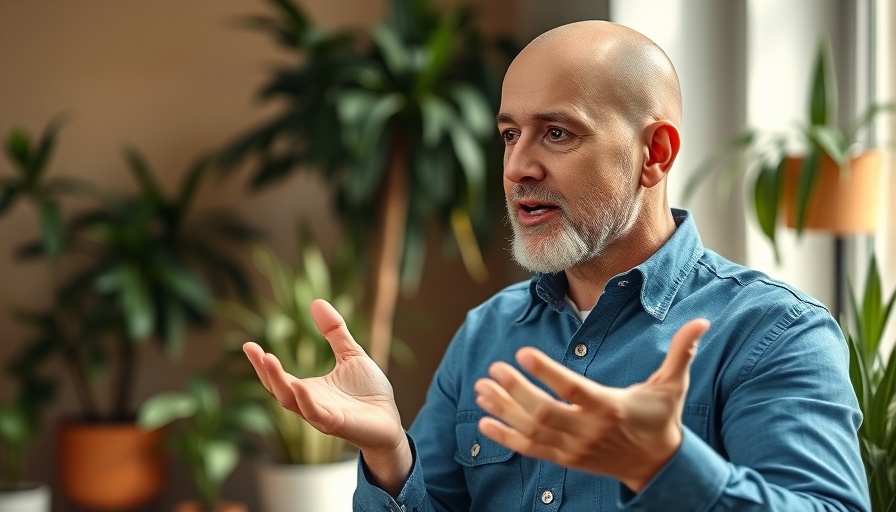
Understanding the Complexity of High Blood Pressure
High blood pressure, often referred to as hypertension, is a condition that affects millions of individuals, particularly those in middle age and older. While many attribute high blood pressure solely to dietary factors, such as salt intake, recent discussions emphasize that the relationship between blood pressure and our overall lifestyle is far more intricate. Exploring holistic approaches to managing blood pressure can lead to healthier outcomes, offering a multi-faceted understanding of this widespread health issue.
In 'High Blood Pressure? It’s Not Just the Salt — This Is What No One Tells You!', the discussion dives into the multifaceted nature of managing hypertension, prompting a deeper analysis of how sleep and lifestyle choices contribute.
Beyond Salt: Unpacking Other Contributing Factors
Many are surprised to learn that factors beyond salt consumption contribute significantly to high blood pressure. Stress, for example, plays a major role in elevating blood pressure levels. Stress management techniques such as mindfulness exercises, yoga, and tai chi not only help in reducing stress but also support overall mental wellness for seniors. Incorporating relaxation techniques before bed can aid in reducing nighttime anxiety, further promoting better sleep quality—a crucial component in maintaining healthy blood pressure.
Sleep and Blood Pressure: A Crucial Connection
The importance of sleep cannot be overstated, especially for older adults. Poor sleep can exacerbate hypertension and other health issues. Understanding sleep hygiene tips for seniors is vital. This includes maintaining a consistent sleep schedule, creating a calming bedtime space, and avoiding screen time before bed. Additionally, natural remedies like herbal teas for better sleep, including chamomile or lavender, can also be beneficial. Prioritizing good sleep hygiene can help regulate blood pressure, enhance cognitive health, and improve overall well-being.
Herbal Remedies: Nature’s Support for Heart Health
As we age, the quest for natural supplements for sleep and wellness becomes increasingly important. Certain herbs have shown promise in managing anxiety and promoting restful sleep, which is critical for those aiming for better blood pressure control. Adaptogens like ashwagandha and rhodiola are touted for their abilities to reduce cortisol levels, thus potentially lowering blood pressure. Moreover, omega-3s—found in fish oil—have been linked to cardiovascular health, emphasizing the connection between dietary choices and hypertension.
Practical Tips for Managing High Blood Pressure
For those navigating high blood pressure, several actionable strategies can foster improvement. Practicing deep breathing exercises for sleep and reducing caffeine intake can create a more relaxing evening environment. Incorporating practices such as journaling for mental clarity and gratitude practices for mental health can help alleviate stress and promote emotional stability, both essential for managing blood pressure. Regular physical activity, such as walking or participating in fitness routines tailored for seniors, is not just beneficial for physical health but also fortifies mental resilience in later life.
Building a Social Support Network
Mental health awareness for seniors emphasizes the significance of social connection. Engaging with friends and family can combat feelings of loneliness that many older adults face. This isolation can elevate stress levels, directly impacting blood pressure. Support groups and mental wellness workshops for seniors encourage sharing experiences and strategies for coping, further fostering community connections that are vital for emotional well-being.
Emotional Health: The Foundation of Physical Wellness
Caring for mental wellness is equally as essential as monitoring physical health, especially when managing conditions like hypertension. Emotional issues such as depression in older adults can affect blood pressure, making regular mental health checkups crucial. Understanding how to manage grief and loss in seniors alongside mindfulness techniques can provide emotional support and improve overall health outcomes.
Looking Forward: Future Trends in Blood Pressure Management
As we learn more about the complexities of health conditions like hypertension, the future holds promise for more holistic approaches to managing blood pressure. Integrative health models, which acknowledge the interconnectedness of body and mind, will likely shape how we address issues of high blood pressure, paving the way for more preventive strategies that encompass diet, exercise, and stress management.
Final Thoughts and Actionable Steps
In conclusion, understanding that high blood pressure is not solely about salt intake is vital for effective management. By adopting holistic approaches, incorporating relaxation techniques, prioritizing sleep, and nurturing social connections, seniors can actively manage their blood pressure while enhancing their overall health and well-being. Taking proactive steps in these areas is not only beneficial for physical health but also crucial for mental wellness and emotional stability. Remember, checking in with a healthcare provider is essential for personalized advice and support.
 Add Element
Add Element  Add Row
Add Row 




Write A Comment